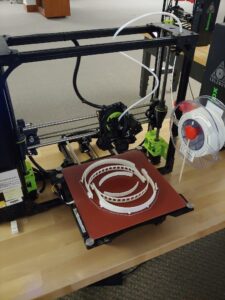
University of Utah engineers are using their expertise and equipment in the ongoing fight against the COVID-19 coronavirus. They are using the university’s 3D printers, laser cutters and other equipment to create new personal protective equipment (PPE) in an effort to keep up with the needs of health care workers who are treating COVID-19 patients.
Part of this campus-wide effort involves creating face shields for medical workers by printing individual components and then assembling the masks into a final product. Other U offices that are part of this initiative include the J. Willard Marriott Library, Spencer S. Eccles Health Sciences Library, the Center for Medical Innovation, and Lassonde Entrepreneur Institute, all of which have 3D printers.
“All efforts towards 3D printing [from the College of Engineering] are being consolidated in the Meldrum Innovation Laboratory (pictured above and left) so that we minimize the number of people who have to be on campus to reduce any contamination risk. As we speak, 3D printers are being moved to that lab,” said U College of Engineering Associate Dean of Research Kevin Whitty. “The library has taken the lead on identifying what needs to be printed, and we are working with the hospital and [U Environmental Health and Safety].”
University of Utah chemical engineering associate professor (lecturer) Tony Butterfield, who is also the Meldrum lab manager in the Merrill Engineering Building, and chemical engineering assistant professor Swomitra Mohanty, are leading the project of consolidating the lab equipment. Also providing 3D printers are COE faculty members Taylor Sparks, Andrew Merryweather, Steven Naleway, Tom Zangle, Robert Hitchcock and Utah Advanced Materials and Manufacturing Initiative lead engineer Devin Young.
Meanwhile, more than a dozen COE faculty this week have donated some 10,000 nitrile gloves, N95 face masks, goggles, and safety glasses to the University Hospital.
Hospitals nationwide and particularly in hotspots where the coronavirus cases have grown, such as New York City, have reported critical shortages of personal protective equipment for hospital workers.